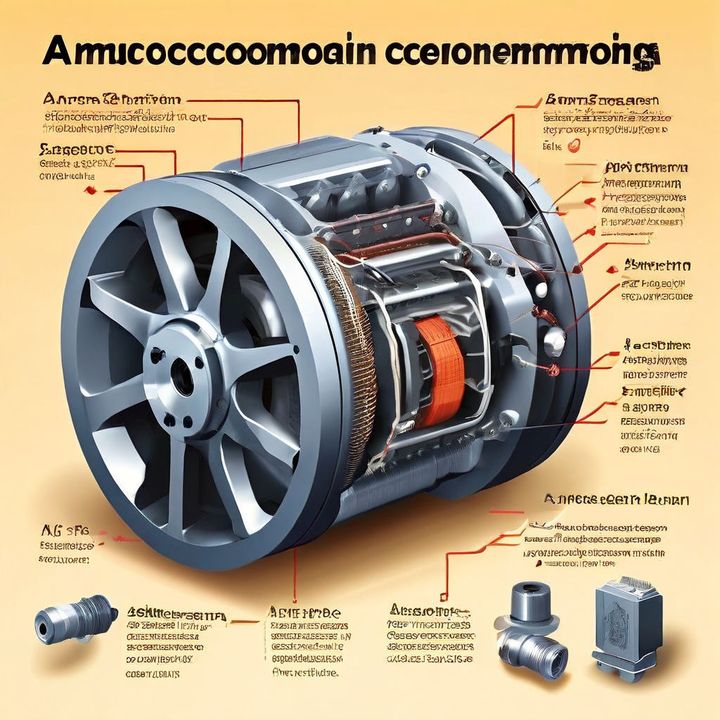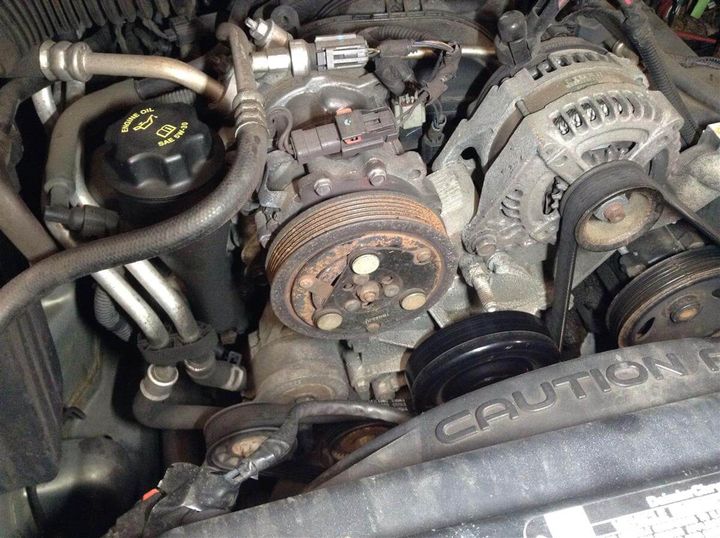


An air conditioning (AC) compressor is a crucial component of the air conditioning system, responsible for circulating and pressurizing the refrigerant. A squealing noise from the compressor can indicate various underlying issues that require attention. This noise is often a warning sign that should not be ignored, as it can lead to further damage or complete system failure if left unaddressed

A squealing AC compressor can be caused by several underlying issues, and it's essential to identify the root cause to address the problem effectively. Here are the most common culprits:
| Cause | Description |
|---|---|
| Loose or Worn Drive Belt | As the belt ages and wears down, it can become loose or develop cracks, causing it to slip on the compressor pulley. This slippage results in that unmistakable squealing noise when the AC is engaged. |
| Bad Compressor Bearings | Inside the compressor, there are bearings that allow the internal components to rotate smoothly. When these bearings wear out, they can lead to grinding or squealing noises as the compressor turns. |
| Compressor Clutch Failure | The compressor clutch engages and disengages the compressor as the AC system is turned on or off. If this clutch fails or becomes faulty, it can cause a squealing noise when the AC is activated, as the clutch struggles to engage properly. |
| High Compressor Pressure | Excessive pressure buildup inside the compressor, due to issues like refrigerant overcharge or blockages, can lead to a high-pitched squealing sound as the compressor struggles to operate under these conditions. |
The compressor is driven by a belt connected to the engine's crankshaft. As this belt ages and wears down, it can become loose or develop cracks, causing it to slip on the compressor pulley. This slippage results in that unmistakable squealing noise when the AC is engaged. It's a telltale sign that the belt needs to be adjusted or replaced.
Inside the compressor, there are bearings that allow the internal components to rotate smoothly. Over time, these bearings can wear out, leading to grinding or squealing noises as the compressor turns. Unfortunately, when the bearings fail, the entire compressor assembly usually needs to be replaced, as bearing replacement alone is often not feasible.
The bearings are subjected to extreme conditions, including high temperatures, pressure, and constant rotation. As they wear down, the clearances between the bearing surfaces and the rotating components become too tight, causing friction and noise.
There are two main types of bearings used in AC compressors:
Ball bearings: These consist of small metal balls that roll between inner and outer races, allowing smooth rotation. Over time, the balls can become dented or the races can develop grooves, leading to noise and eventual failure.
Needle bearings: These are made up of small cylindrical rollers arranged in a cage. They are often used in the compressor's swash plate or wobble plate assembly. As the rollers wear down, they can cause a squealing or grinding noise.
The compressor clutch is responsible for engaging and disengaging the compressor as the AC system is turned on or off. If this clutch fails or becomes faulty, it can cause a squealing noise when the AC is activated, as the clutch struggles to engage properly.
The clutch assembly consists of a pulley, a coil, and a friction disc. When the AC is turned on, the coil becomes energized, causing the friction disc to press against the pulley, engaging the compressor. If the clutch coil fails or the friction surfaces wear out, the clutch may not engage properly, leading to a squealing noise.
In some cases, the squealing noise can be caused by excessive pressure buildup inside the compressor. This can happen due to issues like refrigerant overcharge or blockages in the system, leading to a high-pitched squealing sound as the compressor struggles to operate under these conditions.
The compressor is designed to operate within a specific pressure range. If the pressure exceeds this range, it can cause excessive strain on the internal components, leading to noise and potential damage.
Refrigerant overcharge is a common cause of high pressure, as too much refrigerant in the system can increase the pressure beyond safe levels. Blockages in the system, such as clogged expansion valves or condensers, can also restrict the flow of refrigerant, causing pressure to build up in the compressor.
When faced with a squealing AC compressor, the first step is to identify the source of the noise accurately. Here's how I typically approach the troubleshooting process:
| Step | Description |
|---|---|
| Locate the Source | Turn on the AC and determine if the noise is coming from the compressor itself, the belt area, or somewhere else. This initial step helps narrow down the potential causes. |
| Inspect the Drive Belt | Check the belt for proper tension and look for any cracks, glazing, or damage. The belt should deflect about half an inch when pressed firmly. If the belt is the culprit, adjusting the tension or replacing it may resolve the issue. |
| Listen Carefully | Determine if the noise occurs only when the compressor clutch engages or if it continues while the compressor is running. This can help identify if the problem lies with the clutch or the internal components. |
| Visual Inspection | Look for any visible damage or leaks around the compressor, which could indicate a more serious issue. |
| Use a Mechanical Stethoscope | Placing a screwdriver or stethoscope against the compressor body can help isolate internal bearing noises, confirming if the bearings are the source of the squeal. |
Once the root cause is identified, the appropriate repair can be carried out. This may involve:
Replacing the drive belt
Replacing the compressor clutch assembly
Replacing the entire compressor unit if the bearings are faulty
Evacuating the system, replacing faulty components, and recharging with the correct refrigerant amount in cases of high pressure
As with any mechanical system, preventive maintenance is crucial to ensure the longevity and proper functioning of your vehicle's AC system. Here are some tips I always share with my customers:

Regular inspections: Schedule regular inspections and maintenance for your AC system, including checking the belt condition, refrigerant levels, and overall operation. Catching issues early can prevent more significant problems down the line.
Maintain proper airflow: Ensure that the condenser coils are clean and free of debris, and replace air filters regularly. Restricted airflow can put unnecessary strain on the compressor, leading to premature failure.
| Maintenance Task | Description |
|---|---|
| Condenser Coil Cleaning | The condenser coil is responsible for dissipating heat from the refrigerant. If it becomes clogged with dirt, leaves, or other debris, it can restrict airflow and cause the compressor to work harder, leading to potential failure. Regular cleaning of the condenser coil is essential. |
| Air Filter Replacement | The cabin air filter helps to remove contaminants from the air entering the vehicle's interior. A clogged air filter can restrict airflow and put additional strain on the AC system, including the compressor. Replacing the air filter according to the manufacturer's recommendations is crucial. |
Use approved refrigerants: Always use the refrigerant type and amount specified by the manufacturer. Using the wrong refrigerant or overcharging the system can lead to excessive pressure and compressor damage.
Address leaks promptly: If you notice any refrigerant leaks, have them repaired immediately. Leaks can cause the compressor to operate under low refrigerant conditions, leading to potential damage.
While preventive maintenance can help avoid many compressor issues, sometimes a replacement is unavoidable. The cost of replacing an AC compressor can vary significantly depending on the make and model of your vehicle, as well as the labor rates in your area.
| Repair | Cost Range | Average Cost |
|---|---|---|
| Complete Compressor Replacement | $800 - $2,800 | $1,200 |
| Compressor Cost | $450 - $1,500 | - |
| Labor Cost | $400 - $1,600 | - |
| Clutch or Belt Repair | $100 - $400 | - |
| Annual Maintenance | $75 - $200 | - |
On average, you can expect to pay anywhere from $800 to $2,800 for a complete compressor replacement. This includes the cost of the compressor itself, which can range from $450 to $1,500, and labor costs, which typically fall between $400 and $1,600.
If the issue is limited to a faulty clutch or drive belt, the repair costs can be more manageable, ranging from $100 to $400 for parts and labor.
Regular maintenance, such as system inspections and refrigerant top-ups, can cost between $75 and $200 annually, but this investment can go a long way in preventing more expensive compressor failures down the road.
A squealing AC compressor is a common problem that should never be ignored. By understanding the potential causes, performing proper troubleshooting, and addressing issues promptly, you can avoid more significant and costly repairs down the line.
Remember, preventive maintenance is key to ensuring the longevity and efficient operation of your vehicle's AC system. Regular inspections, proper refrigerant handling, and addressing any leaks or airflow issues can help prevent compressor failures and keep you cool and comfortable on even the hottest summer days.
So, the next time you hear that telltale squeal, don't hesitate to bring your vehicle to a trusted mechanic. With the right diagnosis and repairs, you can bid farewell to that annoying noise and enjoy a refreshingly cool ride once again.
A buzzing noise could indicate an electrical issue or a problem with the fan motor. Turn off the unit immediately and contact a professional HVAC technician for inspection and repair.
Regular maintenance, such as cleaning the coils, replacing air filters, and checking for debris, can help prevent unusual noises from developing. Annual professional servicing is also recommended.
If the squealing noise is caused by a loose or worn fan belt, tightening or replacing the belt may resolve the issue. However, it's best to have a professional inspect the unit to identify the root cause.
A hissing noise often indicates a refrigerant leak, which can be hazardous and should be addressed immediately by a professional HVAC technician.
While lubricating certain components like the fan motor can help reduce noise, it's generally not recommended for homeowners to attempt this themselves, as improper lubrication can cause further damage.
A rattling noise could be caused by loose parts or debris inside the unit. Turn off the air conditioner and contact a professional to inspect and secure any loose components or remove any obstructions.
Yes, a clicking noise, especially when the unit is trying to turn on, can indicate an electrical issue with the thermostat, capacitor, or compressor. It's best to have a professional diagnose and repair the problem.
Listen carefully to determine if the noise is coming from the indoor air handler or the outdoor condensing unit. This information can help the technician identify the source of the problem more quickly.
If the gurgling or bubbling noise is caused by a clogged drain line, clearing the line may resolve the issue. However, if the noise is related to a refrigerant problem, professional assistance is required.
A screeching noise can indicate high pressure in the compressor or worn bearings in the fan motor, which can be dangerous. Turn off the unit immediately and contact a professional for inspection and repair.

Sarah isn't your average gearhead. With a double major in Mechanical Engineering and Automotive Technology, she dived straight into the world of car repair. After 15 years of turning wrenches at dealerships and independent shops, Sarah joined MICDOT to share her expertise and passion for making cars run like new. Her in-depth knowledge and knack for explaining complex issues in simple terms make her a valuable asset to our team.













